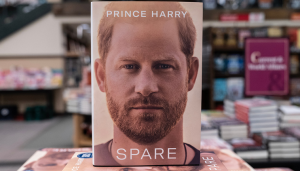A social worker’s perspective on Prince Harry’s memoir

Published by Professional Social Work magazine, 13 February 2023
At many points reading Spare, the social worker in me came alive. From a trauma-informed perspective, it was easy to recognise the impact of traumatic stress on Harry.
I found myself advocating for his safety and wellbeing. The toxic aftermaths of adverse childhood experiences shaped most of his life, leaving an open wound well into adulthood.
Spare is largely about the impact of childhood grief and loss on the lives of children. Harry’s visit to therapy is his attempt to kickstart the grieving process, where he speaks about “the physical and emotional suffering. The panic, the anxiety. The sweats".
Part of Harry was trapped in 1997, his therapist assesses. Internalising unresolved issues from childhood adversity and unspoken psychological trauma through the years appears to have caused harm. He battles to find clarity and purpose in life while dealing with unresolved anger and guilt.
Harry’s quest for ordinariness, in line with Erikson’s theory of development, exposes his struggle with his royal identity and acceptance. If you ever wondered what royalty felt like, this book shows it through the perspective of a prince who prefers an ordinary life. “If I had the choice, I wouldn’t want this life either,” he says.
Harry, in many ways, is relatable, and no different from a young person receiving social work input.
He could be one of my service users. He recounts harmful manifestations of childhood trauma: drinking, drug addiction, early sexual relations, and educational difficulties. At 30, he wears his fears, wondering if he will ever find his true love. This is a traumatised Harry screaming for attention.
Critics have tagged him as being entitled. However, the social worker in me was instantly responsive to Harry’s unique lived experiences. Critics ask why can’t Harry be like William? But siblings respond differently to adversity. William recovered quickly without remarkable distress, while Harry developed post-traumatic stress disorder.
Would outcomes have been different for Harry if he’d had an allocated social worker from a children and families’ team? Could proper early intervention and parenting support have averted the lingering repercussions of trauma? Perhaps trauma-informed social work could have holistically equipped Harry with coping skills to deal with adversity in a healthier manner.
Harry finds sanity, peace and tranquillity in Botswana away from the triggers of his trauma. Back home in Britain, he is constantly exposed to abuse from the British media, a palpable persistent reminder of the cause of his mother’s death. He owns up to his undeniable obsession with the British press and observes: “They can’t break me… because I’m already broken”.
Britain is represented as an unsafe living environment, not conducive for healing and so he seeks escape. Resilience and protective factors are not adequately strengthened, thus increasing Harry’s vulnerability. He is scapegoated all his life as the spare by the British media and longs for intervention from the monarchy but feels unsupported. “That silence was damning. And continuing. And heart rending,” he says.
Harry vows to protect his immediate family, a valid fear of history repeating itself and a bold reaction against the complicity and silence of the monarchy. The driving force of Harry’s memoir is to tell the public his story. “How could I be remembered by history?” he asks. “By the headlines, or for who I actually was?”
Harry may find healing and closure from writing this book. He tells his story with the photographic memory of a bereaved child. It may be the much-needed therapeutic intervention that could bring a final severance of his love-hate relationship with the British press and a resolve not to relapse into this addiction.
Critical thematic social issues of identity, injustice, inhumanity, mental health, racism, class, prejudice, unconscious bias and discrimination, power, privilege, and oppression are spotlighted throughout Spare.
If you want a peek into the lives of materially privileged families who would gain from social work input but usually aren't open to our services, I recommend you read it. I would go as far as to say Spare could be adopted as a beneficial case study in modules for social work students.
Mma Ken-Akparanta is a social worker who currently works within a community care-older adults team.
